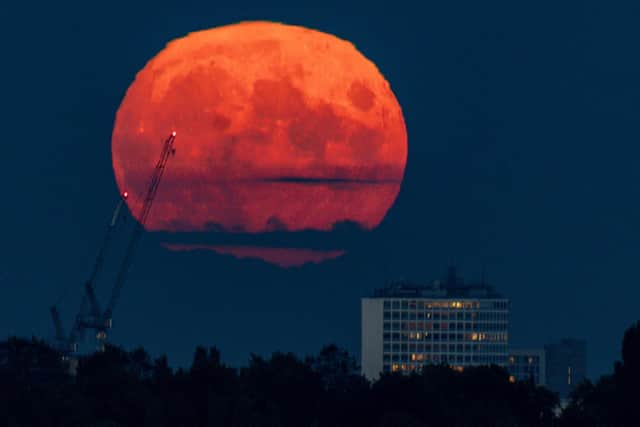Does the moon affect your sleep? Why the full moon disrupts sleep and how you can get a better night's rest
and live on Freeview channel 276
Struggling to fall asleep during periods of a full moon is surprisingly common, with this specific condition being referred to as 'lunar insomnia' by scientists.
While it could be a coincidence that periods of restlessness occur during a full moon, it is believed that there may actually be a link between the lunar cycle and your body clock.


Advertisement
Hide AdAdvertisement
Hide AdThis isn't surprising considering the moon has long been known to affect many processes on Earth.
From controlling the tides to impacting animal behavioural patterns, the moon could have a much deeper link to our life here on this planet than we might commonly think.
So can the moon really affect your sleep?
Here is what scientists believe about 'lunar insomnia'- and the best ways to limit its impact.
How does the moon affect your sleep?
A Swiss study published in the Journal of Sleep Research saw researchers look into the link between lunar phases and sleep.
Advertisement
Hide AdAdvertisement
Hide AdThey analysed the sleep patterns of 31 volunteers over the course of six weeks, which included two full moons.
They found that participants slept for shorter lengths of time during periods of a full moon, and found it harder to fall and stay asleep during this phase.
While it's worth noting that this change was minimal, and participants only slept around 20 minutes less on average during a full moon, the results still showed a correlation between the lunar cycle and rest.
Why does the moon affect your sleep?
The Swiss study concluded that their results may be down to our human biology.
Advertisement
Hide AdAdvertisement
Hide AdScientists have suggested that both men and women have a hormone cycle that coincides with the lunar cycle, and it's this fluctuation in hormones that causes sleep disruption.
However, it's possible that increased light from the full moon could also be responsible for your reduced sleep.
A 2021 study on indigenous Toba/Qom communities in Argentina found that participants stayed awake for longer and had a shorter sleep duration during a full moon.
They suggested that this could be down to the extra amount of light that occurs during these periods, which allowed the community to continue with their tasks well into the night.
Advertisement
Hide AdAdvertisement
Hide AdSince communities without access to artificial light rely on the moon to control their sleep phases, it's possible that we still have this link in our own bodies, even in urbanised areas.
How to get enough sleep during a full moon
Whatever the correlation is between the moon and your sleep patterns, getting a bad night's rest certainly isn't ideal.
Luckily, there are a few steps that can be taken to minimise the impact:
Minimise light
Since it's entirely possible that the moonlight is responsible for keeping you awake, it makes sense to minimise this light as much as you can.
Advertisement
Hide AdAdvertisement
Hide AdInvesting in a pair of blackout curtains or a blind will help keep this light out of your bedroom, plus it will block out any extra artificial light such as the glow of streetlamps.
An eye mask is another great solution.
You may also have a few light distractions in your bedroom that could be keeping you awake too.
To get the best night's rest, switch off all your devices and chargers that could keep you awake.
Try something relaxing
Your mind and body can be very susceptible to the placebo effect.
Advertisement
Hide AdAdvertisement
Hide AdIf you go to bed expecting to get a bad night's sleep due to the full moon, this thinking can cause you to have a restless night.
Setting yourself up to have a good night's sleep can help to combat this, so try to incorporate something relaxing into your bedtime routine.
This can be anything from taking a warm bubble bath, to reading a book, or spending a bit of extra time on a soothing skincare routine.
Invest in a comfortable bed
An old, worn, or simply uncomfortable mattress can have a significant impact on your sleep quality, so it's important that you invest in the right one for you to get a good night's rest.
Advertisement
Hide AdAdvertisement
Hide AdAdvice from Coast Road Furniture states that to choose the best mattress, take a look at the firmness rating, as this is what will determine the level of support your body receives.
The right firmness rating for you can depend entirely on your preference, but your sleeping position can be a good guide.
For back and front sleepers, we usually suggest a medium to firm mattress, while side sleepers should look for something a little softer.
Find out more about the impact of 'lunar insomnia' on the Coast Road Furniture website.
Advertisement
Hide AdAdvertisement
Hide AdSupport the YEP and become a subscriber today. Enjoy unlimited access to local news and the latest on Leeds United, With a digital subscription, you see fewer ads, enjoy faster load times, and get access to exclusive newsletters and content. Click here to subscribe.
